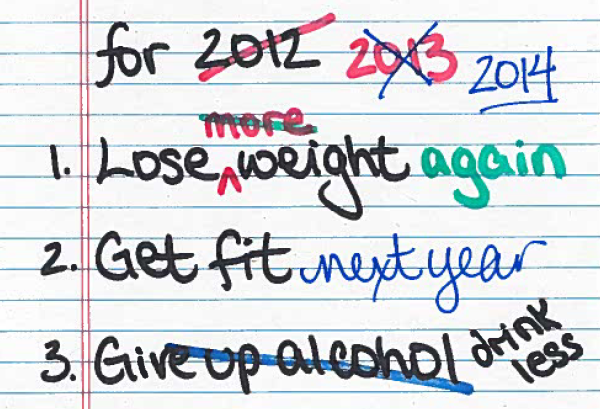Given up Given up your New Years resolution? Why you were destined to fail!
Over two thirds of those who made a New Years resolution this year have already given up. Why do we start with such great intentions but they fade so quickly? And why do we have the naivety year on year to believe that this will be the year we will stick to them?
Humans are heavily habit driven. Our brains interpret signals we receive from the outside world. Interpret is the key word, we determine which signals are important to us and what them mean. Most of these are association driven and most are laid down in childhood. At a very crude level we know that a fire alarm means we should evacuate a building and the scent of food makes you feel hungry. But there are also many signals everyday that we ignore, we begin filtering from the instant we receive them if they are irrelevant or unsurprising and keep more valuable information til later in the processing chain. Only the most interesting signals capture our attention. For example, right now you are (probably) wearing clothes but you aren’t constantly thinking ‘clothes’ ‘clothes’ ‘clothes’.
Our view of any given moment is based on signals we receive, even if these signals don’t make it all the way to conscious attention level. These are then matched with previous receipt of these signals to give us a view on the world that is most likely based on our experience if these inputs. This is automated guess matching is what people refer to when we say we run ‘on autopilot’. It is fashionable right now to accuse the unconcious mind of hijacking our lives and running 90% of the show, it’s also popularly confused with you therefore only using 10% of your brain. In honesty, it’s probably running way more than that, more like 99.9% of functions and you should be thankful for it. If you think about how many cells are operating autonomically every second and how many decisions you make, if 100% of our signals were brought to our attention we would be so overwhelmed we would be unable to function, this is exactly the problems babies face. They have to make sense of an overwhelming array of signals! So to combat this problem we have created filters, that eliminate signals that fall in line with what we expect to happen, and programmed patterns of behaviours that help us perform repetitive tasks to a set series of signals. These are often called habits.
So to change a habit, you could be reprogramming a complex series of behaviours that are below conscious level and triggered by a number of inputs in a number of environments. The longer you have been performing this set of tasks the more you will have strengthened this behaviours set as a safe one, and thus will have to work even harder to do something different and thus change your habit.
Unless you are able to halt the triggered pattern of behaviour you will fail. You must first identify where you are likely to fail, for example, if you are trying to cut out sugary snacks knowing when and where you eat them is the first step. Then you need to bring the moment when you perform these actions to a conscious level. You can do this by tagging a strong mental link to those moments to remind you to perform a different behaviour, taking a walk or eating a healthy snack.
Then when you’ve done this. You must keep doing this. And doing it for at least as long as you performed your previous behaviour of eating sugary snacks for it to become your new habit. Seems easy in the optimistic swings of early January following overindulgence. However if you don’t really want to make the change you are going to quickly run into trouble. You will find excuses to have just one snack, presenting yourself in future days with a choice: “is today a good day where I workout or a bad day where I don’t?”. Ironically you’re now in a worst situation that in the first instance. In addition to reinforcing the behaviour you were trying to eliminate, you introduce choice paralysis and a sense of guilt around not behaving as you had promised yourself. None of the above are healthy over a long period of time.
The best solution here is to find another way of incentivising yourself to reach the goal. When you hear of people just stopping smoking overnight, or exercising everyday it’s because they didn’t notice they were missing the alternative. They enjoy and have built in their new behaviour into their lives. This is what you must do if you are to succeed in a habit change. Once you have made the change, you must focus on the positives of the change and not lapse. If your feeling a sense of dread or guilt, you have the wrong method. Try another way. If you are trying to lose weight, focus on the great things you can eat instead of those things you can’t, if you’re wanting to get fit, pick a regime that gets you excited. Rabble was designed using these principles, our aim is to make exercise as enjoyable as possible. It becomes something that people want to do. And therefore we transform people who weren’t previously exercising into exercise ‘fanatics’, just people who like what they do and have no regrets. They keep going and create new habits. You may have already failed in achieving this year’s new resolution. But reframe your problem, try to create a new habit that you enjoy and is positive.
